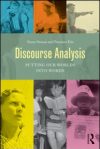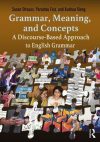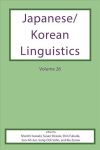Susan Strauss

Curriculum Vitae
Education
Professional Bio
Susan Strauss is a linguist and discourse analyst specializing in the interconnections between discourse, grammar, interaction, cognition, and culture. Professor Strauss’s work centers on the analysis of discourse in English, Spanish, French, Mandarin, Japanese, Korean, and Persian, in multiple settings and contexts, from classroom interaction to Trip Advisor reviews, from Korean reality TV to over-the-counter medicine labels, and paranormal encounters. She appeals to a multiplicity of theoretical approaches related to cognitive linguistics, language ideology, stance, sensory perception, emotion, language socialization, and identity, drawing from such fields as sociolinguistics, psychology, linguistics, applied linguistics, media production, and marketing. Professor Strauss teaches courses in conceptualization-based approaches to language and how to apply such perspectives to language pedagogy (APLNG 484), discourse analysis – using multiple exemplars in English and languages other than English to discern patterns of socio-cultural and ideological meaning that are not overtly transparent at a surface-level reading (APLNG 581), and the interface between language, grammar, culture, and ideology as an introduction to Korean linguistic anthropology (KOR 498). From the applied side of applied linguistics, her work is designed to supplement, complement, and even at times transform traditional approaches to second language instruction, by raising awareness (among students and instructors alike) about the multiple layers of meaning within words, phrases, grammatical constructions, slogans, and a variety of discursive genres using public discourse as the repository for linguistic samples and in-depth analysis. Her goal in conducting discourse analytic-based research is to uncover the underlying tensions between what is said on the surface and what is unsaid, yet what is powerfully meaningful. She is co-author of four books on the topic of discourse and discourse and grammar, for English, Korean, and Mandarin, all of which are designed for an eclectic audience of linguists, language instructors, and students of language.
Select Recent Articles and Book Chapters
Jackson, S., & Strauss, S. (2022). Ghosts and the haunting of the American Dream: The pragmatics of stance and suspense in making the improbable sound possible. Journal of Pragmatics, 198, 54-72.
Strauss, S., & Eun, J. (2022). The intersection of discourse, grammar, register, pragmatics, and culture: Using Trip Advisor and Mango Plate as pedagogical materials for high level teaching practices (HTLPs) in intermediate-to-advanced Korean teaching and learning. In A. Byon & D. (Eds.) The Handbook for Korean as a Second Language (pp. 298-318). NY/London: Routledge.
Strauss, S., Chang, H., & Yoon, J. (2019). The speech went on (and on) as Kerry dozed off (*and off): A Conceptual Grammar approach to on and off. In V. Evans & L. Pickering (Eds.) Language learning discourse and cognition: Studies in the tradition of Andrea Tyler (pp. 85-110). Amsterdam/Philadelphia: John Benjamins.
Strauss, S., Kitt-Lewis, E., & Amory, M. (2019). Everything overwhelms me. Everything. Analyzing caregiver uncertainty and control through stance marking. Qualitative Health Research, 1-16.
Kim, M., & Strauss, S. (2018). Emergent multiplicities of self- and other-construction in Korean workplace-based television dramas. Journal of Pragmatics, 137, 19-36.
Buescher, K., & Strauss, S. (2015). A cognitive linguistic analysis of French prepositionsà, dans, and en and a sociocultural theoretical approach to teaching them. In K. Masuda, C. Arnett, C., & A. Labarca, A. (Eds.), Cognitive linguistics and sociocultural theory (pp. 155-182). Berlin: deGruyter
Emig, B., McDonald, S., Zembal-Saul, C., & Strauss, S. (2014). Inviting argument by analogy: Analogical-mapping-based comparison activities as a scaffold for small group argumentation. Science Education, 243-268.
Strauss, S., & Feiz, P. (2013). Beyond alef, be, pe: The socialization of incipient ideology through literacy practices in a Persian first grade classroom. Language Sciences, 197-219.
Strauss, S., & Young, J. (2011). The emergent construction of interpersonal closeness and distance in problem-solution television programs. The Korean Language in America, 62-82.
Strauss, S., & Xiang, X. (2009). Discourse particles: Where cognition and interaction intersect—the case of final particle –ey in Shishan dialect. (Hainan Island, P.R. China). Journal of Pragmatics, 41 (7), 1287-1312.
Strauss, S. (2008). A conceptual approach to the Japanese existential verbs: The case of aruversus iru. Language Awareness, 179-194.
Strauss, S., & Ahn, K. (2006). Applying conceptual grammar to advanced level language teaching: The case of two completive aspect markers in Korean. The Modern Language Journal, 90, 185-209.
Strauss, S. (2005). The linguistic aestheticization of food: A cross cultural look at food commercials in Japan, Korea, and the United States. Journal of Pragmatics, 37, 1427-1455.
Strauss, S. (2005). Cognitive realization markers: A discourse-pragmatic study of the sentence ending particles –kwun, -ney, and –tela. Language Sciences, 2, 437-480.


